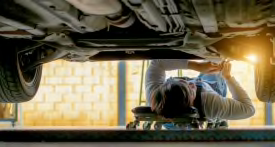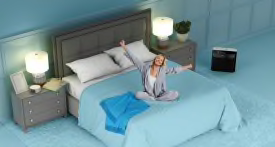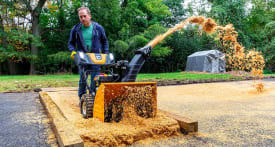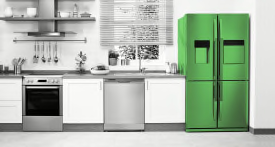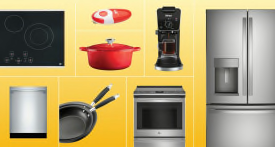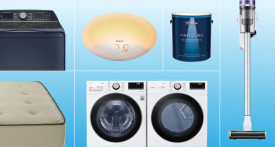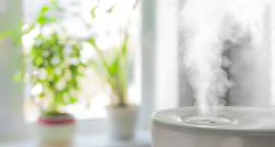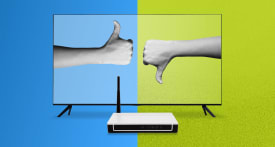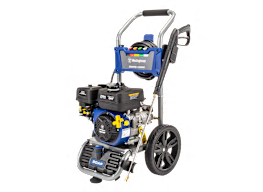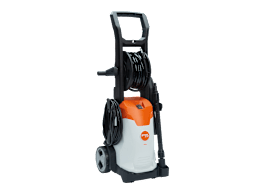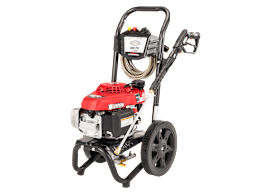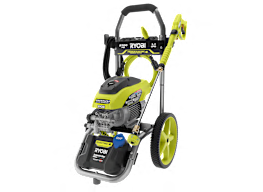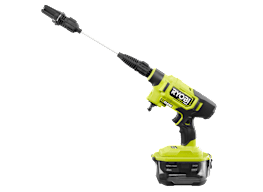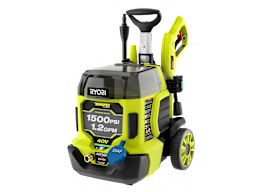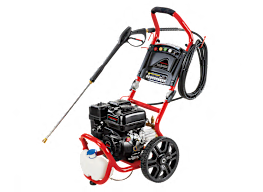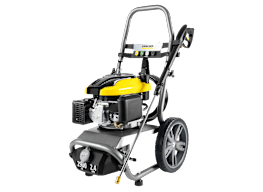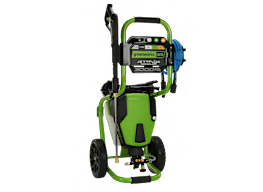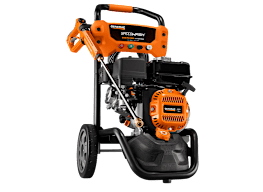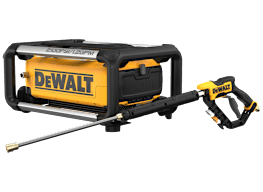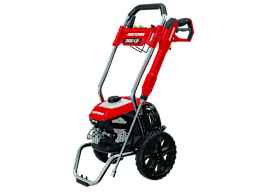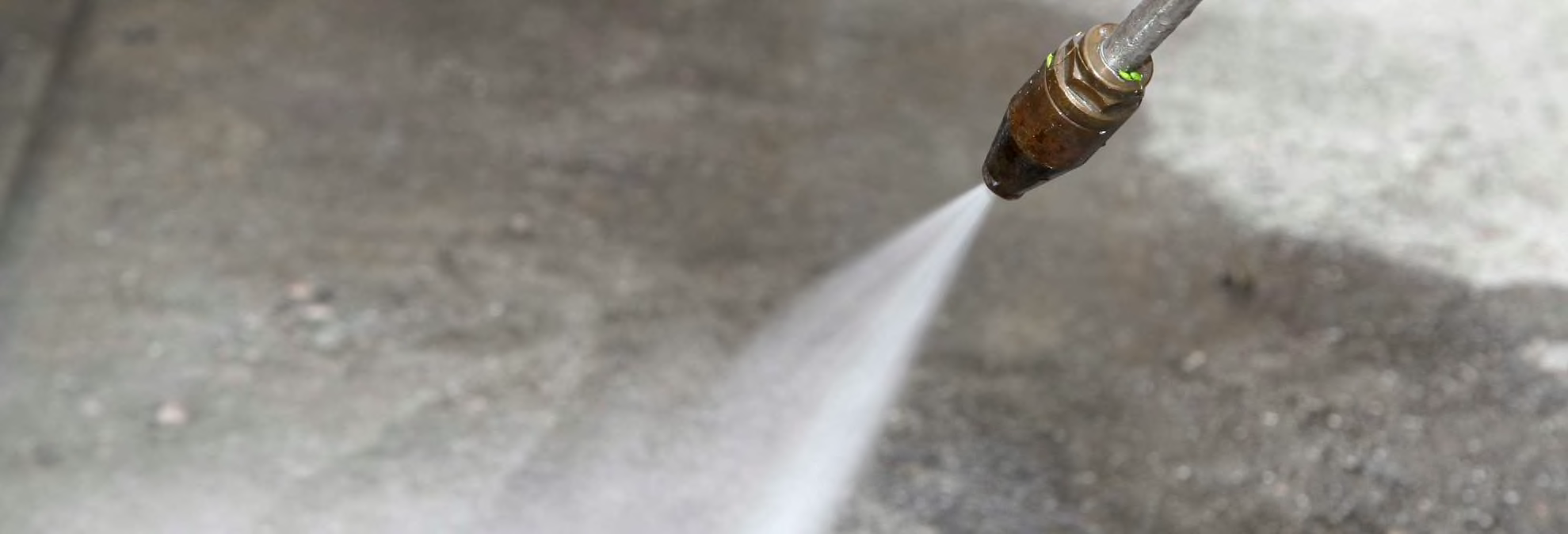
Pressure Washer Buying Guide
A pressure washer is the perfect tool to work magic on concrete, decking, walkways, patios, steps, and more. The best models can erase months or even years of stains with a brief blast.
And by enabling you to completely refresh your wood deck instead of replacing it, pressure washers can also help you spend less. That can mean thousands of dollars in savings, considering the current state of inflation and the ongoing lumber shortage.
But before you break out the heavy artillery, remember that all pressure washers should be used with caution. These tools deliver a concentrated, powerful high-pressure stream of water, capable of causing serious injury and damaging property. For this reason, we limit our recommendations to a subset of the many models we test.
If you want to harness the power of a pressure washer, use Consumer Reports’ safe operating techniques, detailed below, to stay out of harm’s way.
Pressure Washers 101
How They Work
Pressure washers use a gas engine or an electric motor to power a pump, which forces water at high pressure through a concentrating nozzle. The resulting blast washes away accumulated grime on surfaces, such as decks, driveways, and patios. It also cleans a host of other items, like outdoor chairs and some types of siding—all in a fraction of the time it would take with a scrub brush and hose.
Potential Risks
Pressure washers are not merely garden hoses on steroids. Their nozzles shoot water at 30 to 80 times more pressure and have surprisingly strong cutting capabilities, no matter which spray setting you use. Use all pressure washers with caution. When the adjustable wand tip is set at its narrowest spray setting or you’re using the narrowest tip, a misplaced jet of water could land you or a bystander in the emergency room.
Should You Rent or Buy a Pressure Washer?
Renting, rather than buying, a pressure washer allows you to skip the hassle of upkeep and storage. Buying a unit will pay for itself in a few years, as long as you take care of it. Our experts advise that if you use a pressure washer three or more times per year, you’ll save money by buying your own.
If you need soaps, solvents, or other additives, consider a pressure washer that has a built-in soap tank. Tool and cord storage is a plus, as are wheels for heavier models.
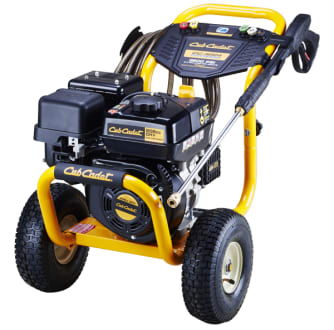
Gas-Powered Pressure Washers
Pros: Delivers higher-pressure water. Quickly cleans large areas, such as decks, siding, and driveways, without the need for harsh chemicals. Deftly dispatches tough gunk, such as chewing gum and tree sap. More pressure means a nozzle set on a wider angle will clean just as well as an electric model run at a narrower setting.
Cons: Relatively noisy and heavy. They require tuneups. Idling for long periods can overheat the pump, possibly ruining the machine if the safety valve fails. Pumps must be winterized with antifreeze in colder climates because gas machines should not be stored inside a home. More power also means an increased risk of injury, as well as gouging, splintering, or etching wooden surfaces, or inadvertently chipping paint.
Price: $280 to $600.
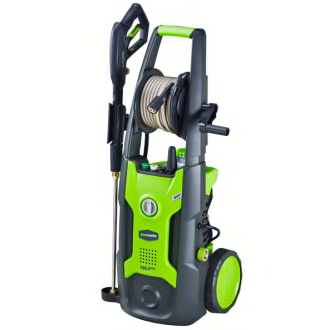
Electric-Powered Pressure Washers
Pros: Best for small decks and patios, outdoor furniture, and other small jobs that require mainly cleaning instead of stain removal. The models are relatively light and quiet, require little upkeep, and create no exhaust emissions. They start and stop conveniently. They do not need winterizing if brought indoors, and their small size makes them easy to store.
Cons: Lower water pressure makes for longer cleaning time. Wands and nozzles are less sturdy plastic material, rather than the metal fittings found on gas-powered models. Your cleaning area is limited to the length of your unit’s cord and hose. Hoses are typically about 25 to 30 feet; their power cords around 35 feet.
Price: $90 to $350.
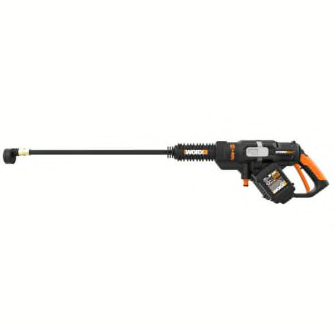
Battery-Powered Pressure Washers
Pros: These tools use a lithium-ion battery for power, and offer an amped-up alternative to cleaning with a regular garden hose. Most don’t produce a ton of pressure, which makes them a better choice for lighter-duty cleaning tasks, such as washing a car. The batteries used in these tools can sometimes also be used to power other tools, like cordless drills, from the same manufacturer.
Cons: Battery-powered pressure washers are no substitute for a full-sized model if you need to do a deep cleaning. Pressure typically maxes out around 500 pounds per square inch, compared with the 1,000 to 2,300 psi produced by corded electrics; gas models can produce up to 3,000 psi.
Price: $100 to $350.
All About Pressure Washer Nozzles
The main danger with pressure washers involves the angle and focused intensity of the water being sprayed. This is controlled by the nozzle at the tip of the pressure-washer wand. Pressure washers vary from brand to brand. They are sold with either a set of color-coded interchangeable nozzles or an all-in-one adjustable nozzle; both types (illustrated below) allow you to change the angle (or spray vertex) of water, depending on the task.
Adjustable nozzles are more convenient than replaceable ones; a twist is all it takes to change the spray width or pattern. But replaceable nozzles let you customize the spray pattern with specific spray angles.
To reduce the risk of injury, never use either the red, zero-degree replaceable nozzle or the zero-degree setting of an all-in-one (adjustable) nozzle. Higher-degree nozzles or settings can get the job done without unnecessary risk.
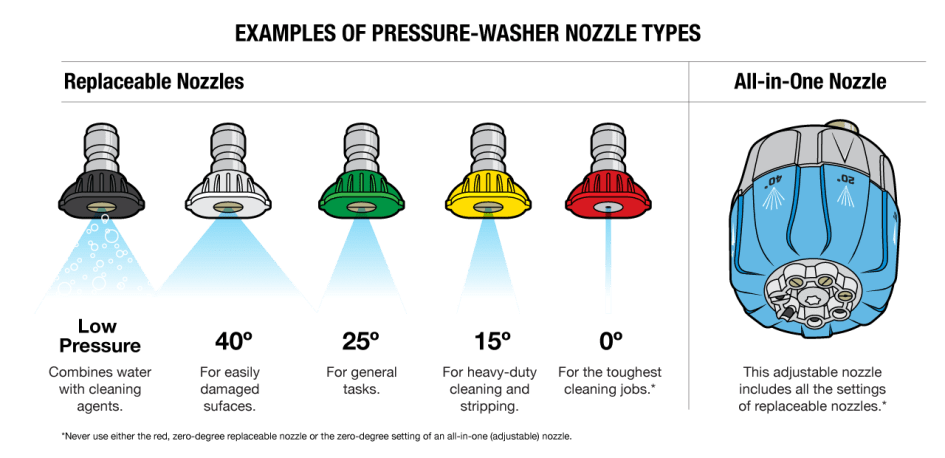
Chris Philpot Chris Philpot
Video Buying Guide
Watch our video below for more.
Pressure Washer Safety
Thousands of people end up in the emergency room most years with injuries related to pressure-washer use. The velocity of the water can tear through skin and the tissue beneath, and may cause a bacterial infection.
A zero-degree spray—produced by a red-colored replaceable nozzle tip or the minimum setting on an adjustable model—concentrates the full force of water into a pinpoint blast and poses an unnecessary safety risk. You can get the same cleaning effectiveness with a wider-angle setting; it will just take a bit longer. Consumer Reports does not recommend any pressure washer with a zero-degree nozzle or setting, no matter how well it cleans. And if the unit comes with a red, zero-degree nozzle, we recommend that you get rid of the nozzle and avoid using pinpoint settings to reduce the chance of damaging property or causing injury.
While all pressure washers are noisy, gas-powered units are significantly louder. We recommend hearing protection (such as earplugs or earmuff-style headsets) if you are working near the washer unit. But if you stretch out the hose and work at a distance from the washer itself, the noise should not be hazardous. Here are some quick tips to keep in mind.
Do’s
• Read the manufacturer’s manual.
• Wear goggles, long pants, and sturdy footwear (no flip flops), and take extra care on wet surfaces, which can quickly get slippery.
• Always start with the widest spray angle. Begin by working with the nozzle 2 feet away from the surface and move closer as needed.
• If your washer uses replaceable spray tips, turn off the engine and press the trigger to drain excess water before changing tips.
• Test-wash a surface patch in a less noticeable area until you get the hang of the machine.
• Take care if washing or rinsing your car. A garden hose would work more gently on your car’s paint job.
Don’ts
• Don’t get closer than 6 inches to whatever you’re cleaning. You could damage paint, pockmark the asphalt of your driveway, puncture your car’s tires, and gouge holes in deck wood.
• Don’t let the engine run for long on a gas pressure washer without pressing the trigger to prevent the pump from overheating.
• Don’t use a pressure washer while standing on a ladder. Pulling the trigger could cause recoil and throw you off balance.
• Don’t point the nozzle toward yourself, other people, or pets.
• Don’t use an extension cord with an electric-powered model.
For more information read “Pressure Washer Safety Alert.”
Pressure Washer Brands
A large manufacturer of gas pressure washers, Briggs & Stratton also makes the gas engines used on models from other brands.
Champion makes gas pressure washers sold online and at smaller dealers, as well as on Amazon.
Formerly the house brand of Sears, Craftsman now sells gas and electric pressure washers at Lowe’s, as well as at a small number of Ace Hardware stores.
A large manufacturer of gas-powered pressure washers, with models sold online and at smaller dealers.
A large tool company that sells gas-powered pressure washers online as well as at Home Depot.
Generac makes gas pressure washers and sells them online, as well as at home centers including Home Depot.
Greenworks makes only electric pressure washers, but it’s one of the largest players, with models available at Tractor Supply and Lowe’s stores.
Kärcher was one of the earlier manufacturers of electric pressure washers and currently sells models on Amazon as well as at Home Depot.
NorthStar is one of the only manufacturers of 240-volt electric pressure washers, which produce power on a par with gas models. Look for NorthStar models at private dealers.
The house brand of Harbor Freight tool stores, Predator offers competitively priced gas pressure washers.
Ryobi is a Home Depot exclusive brand that makes aggressively priced gas and electric pressure washers.
Simpson exclusively makes gas-powered pressure washers. Its models are sold online as well as at Tractor Supply and Home Depot.
Sun Joe makes electric pressure washers that are sold online as well as at Home Depot and Lowe’s stores.


